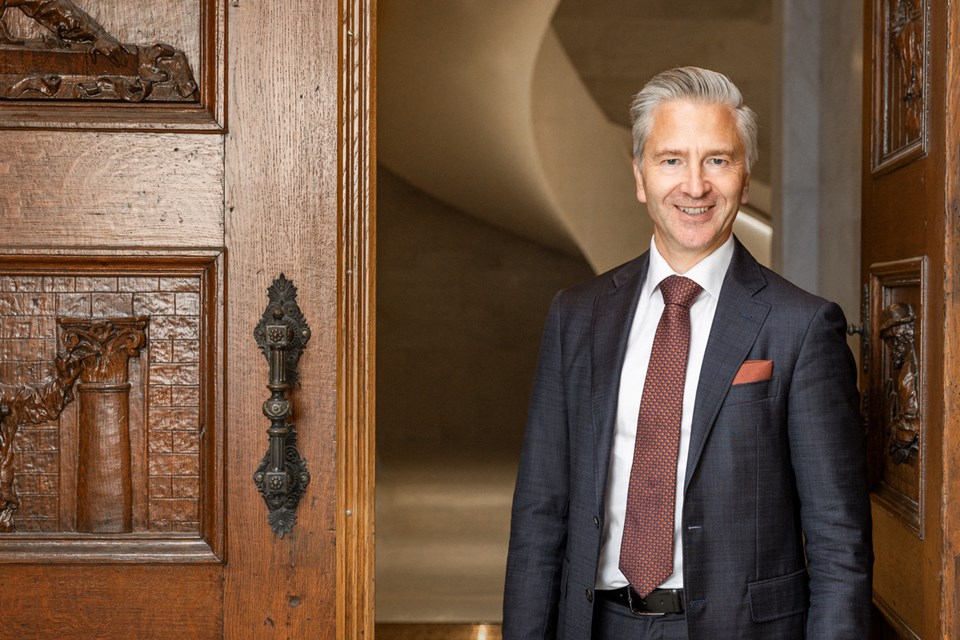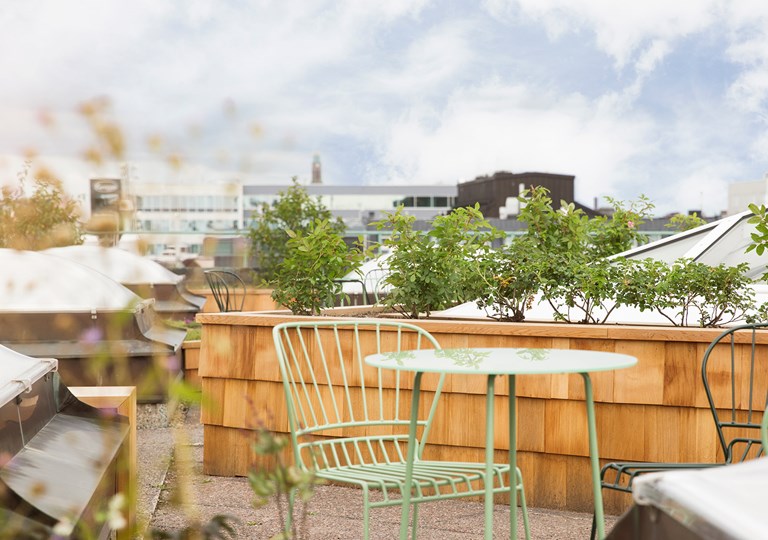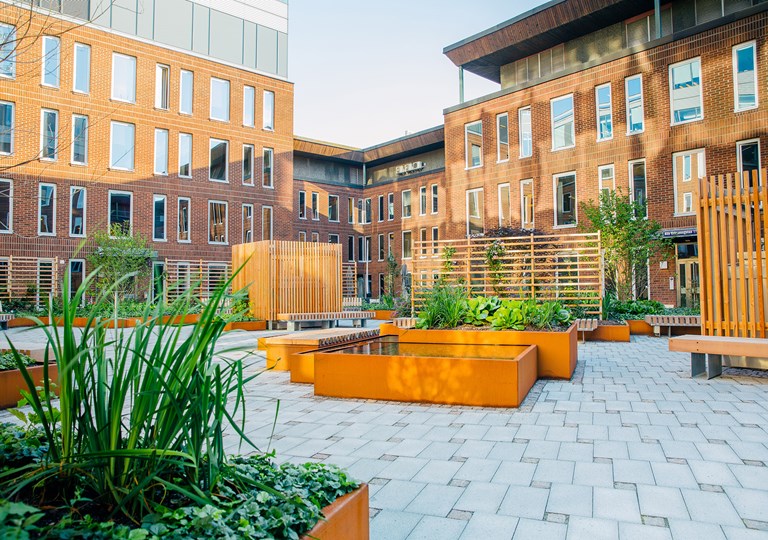
The past year has been dominated by continued high uncertainty in the world around us, with wars in both Europe and the Middle East, high inflation and rising interest rates. In these turbulent times, Hufvudstaden’s low risk profile is showing its strength. We are affected by the global situation like everyone else, but due to our low loan-to-value ratio and strong financial position, we can complete our major development projects and continue the transition to reduce our emissions.
Hufvudstaden owns some of the finest properties in Stockholm and Gothenburg, all in attractive city locations. In 2023, demand for modern offices in central locations was stable. Despite the difficult situation for retailers, we managed to keep our vacancy rate low. I am proud of what we achieved together during this challenging year. Gross profit from property management increased for the third consecutive year, and we maintained our top position in the annual Customer Satisfaction Index for offices. That shows how we are focusing on the right things in our day-to-day operations.
Attractive marketplaces
Hufvudstaden’s centrally located property portfolio has been built up over more than a hundred years. Our properties and marketplaces are very attractive to both retailers and office tenants. To be the first choice, we must continue to evolve in line with behavioural and external changes. Key conditions are proximity to public transport and a wide range of services, stores, restaurants and cultural experiences. Our aim is to create places where people thrive, and where conditions are optimal for successful business.
Bibliotekstan in Stockholm is one of the marketplaces that we manage and are developing. Vildmannen 7 is located here, a property that was inaugurated at the end of summer after several years of work to restore the fire-damaged building. The property is totally unique, with a modern and flexible building behind the carefully preserved sandstone facade from the 19th century. The building adds significant cultural heritage value to Bibliotekstan and has attracted the establishment of strong brands. Hufvudstaden’s largest development project is Kvarteret Johanna (the Johanna block) in Gothenburg. The project is progressing according to plan and the frame for the extension reached full height during the year. Work on the windows, façades and foundations for the new buildings is ongoing. A vibrant meeting place is under development here, with retail and offices that will strengthen Gothenburg’s city centre.
Stable office market in our central locations
The office market has changed in recent years due to an increase in remote work and a more digital way of working. The biggest changes in office design are better social spaces, new areas for creative collaboration and more digitalised meeting rooms. For many large companies, the hybrid working model has also reduced the need for space. Demand for modern offices in better locations has increased, while interest in outdated offices in less attractive locations has decreased. To promote office attendance and attract the best employees, the location and design of offices has become increasingly important. This trend is favourable for our centrally located properties, as confirmed by our renegotiation with Danske Bank in the Packarhuset property on Norrmalmstorg.
The office rental market has remained generally positive, but letting processes are taking slightly longer. Vacancies in Stockholm were within the normal range and market rents showed a positive trend. In Gothenburg, the market was impacted by an oversupply of new office properties. The vacancy rate increased to more than 10 per cent, and market rents rose slightly. The market for flexible office solutions continues to grow and we see major business benefits from our broad office offering of Own office, and our turnkey office REDO and Cecil Coworking. In that way, we can follow our customers and their gradually changing
needs, and always provide them with an attractive offering.
Challenging for some retailers
Many retailers are still facing major challenges. Consumers are tightening their wallets to cope with increased costs, mainly for food and housing. This trend has benefited the low price segment, which is also confirmed by our tenants in this segment. In Stockholm, luxury and premium brands also performed well. This was particularly noticeable from the high interest shown for establishment in Bibliotekstan, with many new store openings and low vacancies. In the NK department stores in Stockholm and Gothenburg, the physical and digital progress continued with a focus on efficiency improvements and improved communication with customers. The number of redevelopments was down compared to recent years, and efforts were more focused on activities and experiences that drive visits and sales. Overall, physical retail improved slightly during the year and physical stores are still important for most players. More and more brands that started online are now choosing to open a physical store. The number of physical stores is being reviewed in most segments, and location and marketplace are now even more important when making an establishment choice.
Sustainability and climate
Hufvudstaden has a long-term perspective and sustainability is an integral part of our business strategy. Our aim is to own properties with essentially good architecture, major flexibility and high quality materials, that subsequently have a longer life and are less frequently rebuilt. The biggest source of our emissions is energy use and construction projects. Here, we see the major benefits of having our own maintenance staff who work every day to optimise the management of our properties, minimise our climate impact and ensure high customer satisfaction. New technologies are continuously tested in redevelopment projects to find energy-smart and robust solutions. If a new technology works well, it is gradually installed in our other properties. During the year, several energy-saving projects were completed with positive results, including solar and geothermal energy installations. We are working to future-proof our properties and completed a number of measures during the year to prevent and reduce damage from heavy rain, for example. Hufvudstaden is working to achieve economic, social and environmental sustainability and a first place in the Mixed use category in Europe of the international sustainability ranking GRESB confirms that our systematic sustainability work is progressing well.
Cautious property market
The changing conditions with higher interest rates have had a major impact on the property market. Property owners have focused on making interest payments and addressing upcoming loan maturities. Several companies needed to sell properties and issue new shares to pay their debts. This led to an imbalance in the market with discrepancy in price expectations between buyers and sellers. Yield requirements rose in both Stockholm and Gothenburg and the total transaction volume in Sweden declined to just over SEK 100 billion. This is the lowest turnover for many years. When interest rates were low, the differences between attractive properties in prime locations and properties in less attractive locations narrowed. We can see now that the difference is starting to widen again. Both tenants and investors are increasingly requesting high-quality properties with modern and attractive premises. The commercial property sector is largely immune to cost increases because rents are indexed and rise at the same rate as the CPI. The increase was 10.9 per cent in 2023 and will be 6.5 per cent in 2024. While the entire increase cannot be passed onto tenants in the long term, this improves the net operating income in the property valuations which, to some extent, offsets the negative effect of rising yield requirements. At year-end, the value of Hufvudstaden’s property holdings was 46.7 billion.
Higher earnings in the property management operations
The office operations performed favourably during the year with increased rents from indexation, new leases and renegotiations. The year was challenging for the retail sector. The decline in household purchasing power had a negative impact on store sales. Gross profit from property management increased by 10 per cent to SEK 1,359 million (1,235). Financing costs have gradually risen but Hufvudstaden has a low loan-to-value ratio and good access to capital. During the year, new financing was raised through both banks and the capital market. The net result for the year was SEK –1,927 million (722). The decrease can be attributed to negative unrealised changes in the value of the property holdings.
The future
2023 was a challenging year but I feel very confident about 2024. With our excellent properties and strong financial position, we hold a unique position in the market, which gives us good prospects for the future. Together with other operators, we develop attractive and sustainable marketplaces in Stockholm and Gothenburg where businesses, brands and people can thrive, feel secure and develop. In the coming year, we will intensify our focus on the property management operations, optimise the operation of our properties and stay close to our customers in order to understand their needs. Our current development projects are progressing and will create new cash flows moving forward. Our proven strategy remains firm with a strong customer focus and high-quality products and services, and we will create new sustainable values in the property holdings with our internal expertise. Finally, I would like to thank all of our customers for your cooperation and Hufvudstaden’s employees for their hard work, great commitment and courage in a challenging time of great change.
Stockholm, February 2024

Anders Nygren
President


